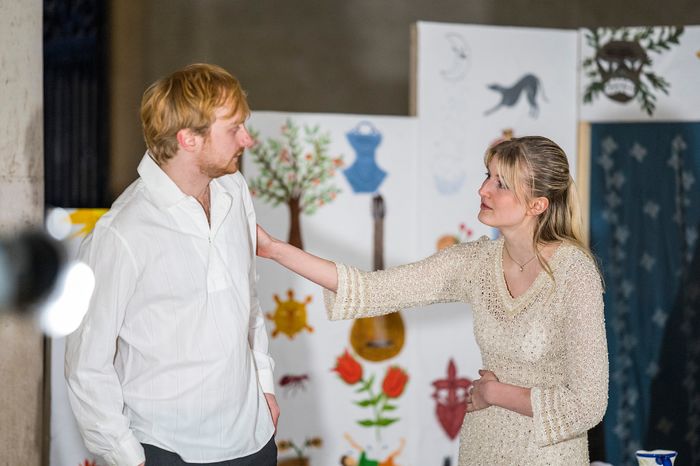“Let’s do-o-o it!” Cambridge Does Comic Relief: Blackadder Goes Forth
Kasia Gibson reports from the opening night of a cunning plan executed to perfection

Walking into the Corpus Playroom on Tuesday evening, you’d be forgiven for thinking you were in the wrong place. It’s a small, intimate space, often used for sketch shows and smokers, and other shows that don’t require excessive amounts of scenery. You get a table, a chair, and if the production team is feeling indulgent, a few posters. That was not the case for the Cambridge re-imagining of Ben Elton and Richard Curtis’ Blackadder Goes Forth. The audience was transported back to 1917, with the corrugated steel and mud walls of the trenches, a small patch of dirt that was necessary for a small but excellently delivered joke, and crackly wartime songs. There was the promise of a show with the same production value as a 1980s sitcom.
The show was not afraid to lean into its sitcom origins. At a certain point, it was necessary to acknowledge that these characters were initially made famous by comedy greats such as Rowan Atkinson and Stephen Fry, so a carbon copy would not only be pointless, but also an insurmountable challenge (although it must be said that Thomas Sweeney’s mannerisms were a masterful impersonation of Hugh Laurie). Instead, the performance never forgot that it was both an old sitcom and a student stage play. The German accents weren’t accurate, but they were an excellent impression of every German TV stereotype at the end of the 20th century. Effective stage fighting at the Corpus Playroom, with its L-shaped audience, would have been a logistical nightmare, so it was deliberately evident that none of the punches were real. Having an aeroplane be shot down on stage would probably distress the audience somewhat, not to mention creating a horrendous risk assessment for the production team, but the cast avoided this issue successfully with some masterful direction. The show was exactly what it promised, so the audience was willing to play along.
“The show was not afraid to lean into its sitcom origins”
I was initially a little surprised at the choice of episodes, which featured ‘Private Plane’, complete with Lord Flashheart’s particular brand of misogyny, and ‘Goodbyeee’, which, as the title suggests, is not the cheeriest. However, as the show progressed I realised that the potential challenges had in fact influenced the selection of these two episodes. Flashheart was notorious for his exaggerated use of innuendo and regular pelvic thrusting, all of which would be deemed inappropriate in this day and age. This issue was addressed head-on with the casting of Sophia Orr as the prejudiced pilot, complete with long, blonde hair and a comedic fake moustache. Here, Flashheart was the butt of the jokes, confined to an old-fashioned, chauvinistic stereotype of history, but Orr ensured that he was still played with high energy and superb comic timing.
I queried the choice of ‘Goodbyeee’ for a different reason: it’s devastating. While I found minor issues with some enunciations, meaning crucial words were lost and some jokes fell flat, the biggest issue I had with the show is that it made me tear up at a sitcom episode from 35 years ago. As the team prepared to go ‘over the top’, the overall humour was toned down while they reckoned with their impending deaths. I was worried this tonal shift would not be handled properly, but, again, I was proven wrong. Isaac Allen excelled in a scene where Blackadder had to comfort Sweeney’s George as he dealt with the clash between his vibrant wartime spirit and his fears of dying. Niamh Howat’s Captain Darling was heartbreaking as he listed his dreams that have been ruined by the war. Nia Morris’ Melchett and Helen Brookes’ General Haig were frustrating representations of bureaucratic unfairness.
“It captures the wartime era and the bygone sitcoms of the 80s, while also feeling grounded in 21st century discussions”
Joshua Willis brought particular poignancy to the character of Baldrick, in a way that was unexpected for fans of the original show. It was surprising to see him in a way that was best described as loveable, as opposed to Tony Robinson’s grotesque caricature that the audience was familiar with, including an endearing moment where he was polishing his shoes with a stuffed rat. This reading of the character was especially effective for one of the show’s most explicit anti-war moments, as Baldrick burst out with childlike indignance that the war would be stopped if both sides simply stopped killing each other, and it was this moment of genuine confusion at humanity’s propensity for violence that was the most distressing of all.
Cambridge’s new adaptation of Blackadder is hilarious, visually striking and deeply moving. It simultaneously captures the wartime era and the bygone sitcoms of the 80s, while also feeling grounded in 21st century discussions. I strongly recommend seeing it before its run ends on Saturday. And I promise I’m not just saying all this because it’s for charity.
 News / Uni Scout and Guide Club affirms trans inclusion 12 December 2025
News / Uni Scout and Guide Club affirms trans inclusion 12 December 2025 News / Cambridge Vet School gets lifeline year to stay accredited28 November 2025
News / Cambridge Vet School gets lifeline year to stay accredited28 November 2025 Science / Did your ex trip on King’s Parade? The science behind the ‘ick’12 December 2025
Science / Did your ex trip on King’s Parade? The science behind the ‘ick’12 December 2025 News / Cambridge study finds students learn better with notes than AI13 December 2025
News / Cambridge study finds students learn better with notes than AI13 December 2025 News / Pembroke to convert listed office building into accom9 December 2025
News / Pembroke to convert listed office building into accom9 December 2025








